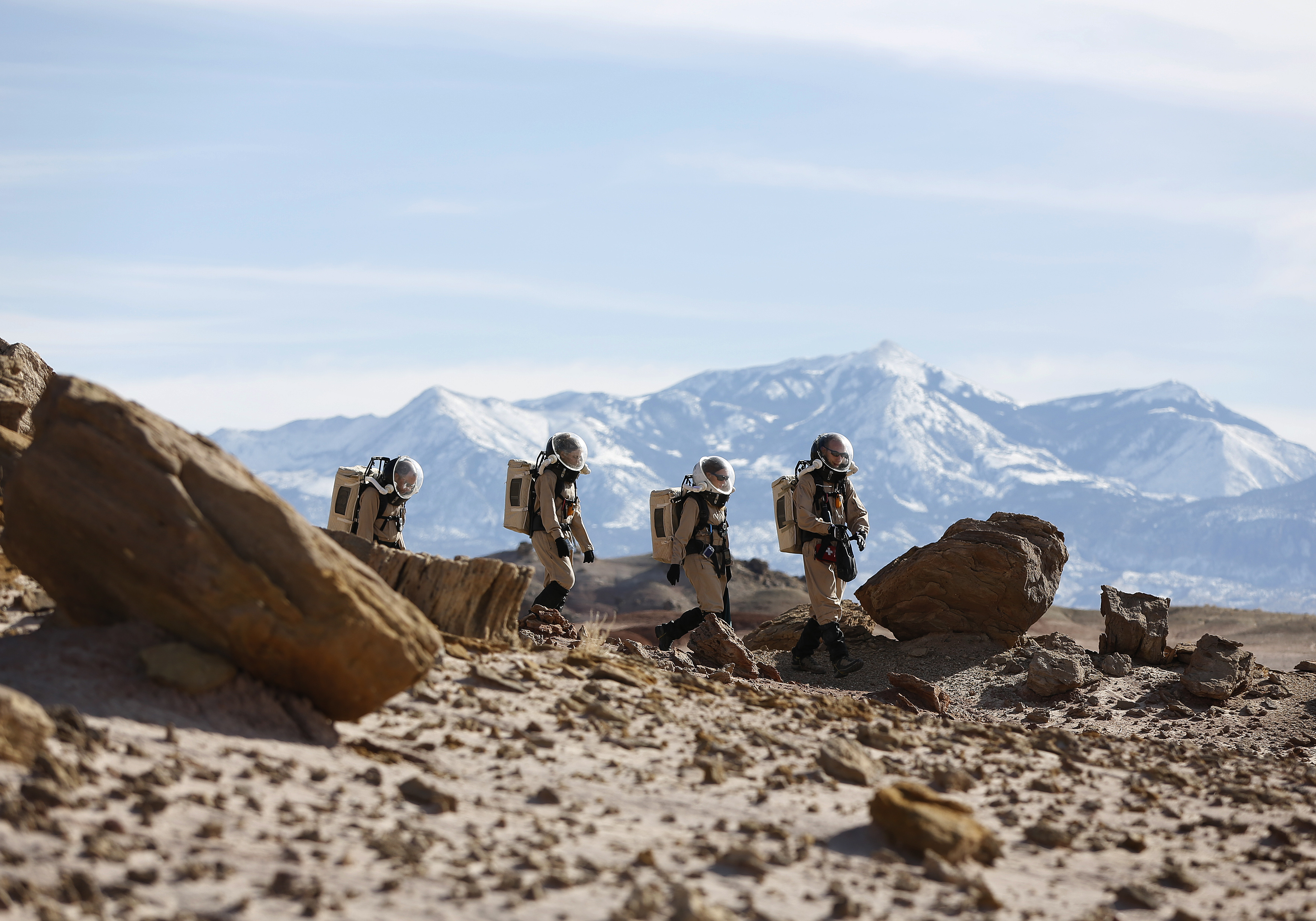How we're prepping for a mission to Mars
How will low gravity and radiation affect astronauts during the long journey to Mars? How will astronauts keep from going homicidal from space-boredom? How will they get water, and what will they eat?


A free daily email with the biggest news stories of the day – and the best features from TheWeek.com
You are now subscribed
Your newsletter sign-up was successful
Scientists applauded last year's marooned-on-Mars movie The Martian for its realism, from the coppery hue of its landscapes to its portrayal of NASA. Though celebrity-scientist Neil deGrasse Tyson insisted NASA would never leave a man behind in real life, he said that the film got the basic science right, and that if someone did miss the rocket home, "let it be the person who knows science." Matt Damon’s botanist character made a fine space-Crusoe, digging up and reviving a Martian lander from the '90s, inventing a semaphore system, and growing potatoes in his own feces.
Of course, NASA's real-life plan to get humans to Mars by the 2030s often makes the movie seem tame (it involves asteroid lassoing and a super fast plasma-rocket, among other things). But interplanetary exploration isn't all fun and ion-thrusters; NASA and other wannabe Martians are also putting in a lot of groundwork on the less romantic side of a Mars mission: How will low gravity and radiation affect astronauts during the long journey to Mars? How will astronauts keep from going homicidal from space-boredom? How will they get water, and what will they eat?
The first tricky thing about Mars is getting there. Space agencies have to time mission launches to coincide with the period when Mars' and Earth's orbits bring the planets closest together (a mere 33-odd million miles), which occurs only every couple years. Even then, the journey is upward of six months with current technology (though it could be substantially quicker with that plasma-rocket). Right now, NASA is working on its Orion lander, the cone-shaped module where astronauts will strap in during takeoff and landing. During the journey, they'll live in a larger module. NASA hasn't released its design for that one yet, but if the International Space Station is anything to go by, the astronauts' living quarters will be cramped, crowded with research equipment, and tubular.
The Week
Escape your echo chamber. Get the facts behind the news, plus analysis from multiple perspectives.

Sign up for The Week's Free Newsletters
From our morning news briefing to a weekly Good News Newsletter, get the best of The Week delivered directly to your inbox.
From our morning news briefing to a weekly Good News Newsletter, get the best of The Week delivered directly to your inbox.
Although the trip seems like the perfect time for the astronauts to finally finish Ulysses, it might be kinder and easier to just have them sleep through it. Vladyslav Vyazovskiy, a neuroscientist at the University of Oxford, is working with the European Space Agency on the question of whether it might be feasible to put humans into hibernation. "Torpor appears to have evolved to effectively fill the gaps during those times of the year when there is no need for certain animals to be out in the world," Vyazovskiy writes in a post on The Conversation. Still, we don't even know how animals induce or come out of hibernation, Vyazovskiy notes, so human hibernation might be even further off than a Mars mission.
Other challenges faced by the astronauts include boredom and, well, each other. Annoyances, squabbles, and other tensions are bound to come up between people who spend so much time together in so little space. The cramped conditions won't get any better once they reach Mars, where the astronauts likely will live in a series of small domed huts. Since 2013, crews of astronauts have lived in the NASA-funded Hawaii Space Exploration Analog and Simulation (HI-SEAS), a 1,000-square-foot geodesic white dome high on the slopes of the Big Island's Mauna Loa. Communications are delayed to simulate distance back to Earth, and the pseudo-nauts must wear a space suit anytime they leave the dome. The missions, of four, eight, and 12 months, are designed to test how cramped conditions might affect crew performance during a Mars mission.
Sheyna Gifford, a member of the crew of six that entered the dome last August, says that so far everything's gravy. "I've kept an eye out for interpersonal stress, and weakness from it," she writes in a post on Nautilus. "Instead, I've found a heightened awareness of interdependence."
But part of the stress of living on Mars would be the existential threat of the environment itself, which is difficult, if not impossible, to replicate in tropical paradise. The Martian atmosphere is almost totally devoid of oxygen and is of much lower pressure than Earth's; gravity is less than half as strong, and the average surface temperature is minus-80 degrees Fahrenheit. Housing and work environments on Mars would be shielded to protect residents from radiation, but the trip to Mars would still expose astronauts to a big dose. Astronaut Scott Kelly recently returned from nearly a year aboard the International Space Station — sore and fatigued, he said, but otherwise feeling fine. Scientists are running a battery of tests comparing Scott and his identical twin brother, Mark, who remained on Earth, looking for physical and genetic effects of Scott's time in space — an important preliminary step before sending anyone to Mars.
A free daily email with the biggest news stories of the day – and the best features from TheWeek.com
Scientists are also interested in how the Martian environment might affect crop growth. Although the planet may not have readily accessible surface water, the moisture in its atmosphere could support agricultural efforts. A team at the Luleå University of Technology in Kiruna, Sweden, recently developed an instrument to test the movement of water through the Martian environment, using salts to pull moisture out of the air. It could "easily be adapted to 'water-farms' for in-situ resource production," Javier Martin-Torres told New Scientist. "We will produce Martian liquid water on Mars, that could be used in the future exploration of Mars for astronauts and greenhouses."
Barren Martian soils hopefully won't be a problem, despite the presence of poisonous salts (you can wash the salts out, The Martian author Andy Weir tells Modern Farmer). Researchers at the Wageningen University and Research Centre in the Netherlands recently harvested tomatoes, peas, rye, arugula, radish, and garden cress that they grew in soil meant to simulate soil found on Mars. "It shows that Mars soil simulant has great potential when properly prepared and watered," researcher Wieger Wamelink said in a press release. "Only the spinach showed poor biomass production." (Bummer.)
The first crop, though, might be potatoes. NASA is partnering on a project with the International Potato Center in Peru to find especially hardy breeds of potato, which it could then send to Mars in a small, self-contained growing box. They're trying to test the limits of potato tolerance for low temperature and low pressure, says Chris McKay, a planetary scientist at NASA Ames. The less NASA has to make a greenhouse mimic conditions on Earth, the less energy and expense. Potatoes could make an ideal space-crop, McKay says — they're "pretty tough organisms, certainly tougher than humans" — but there's also an appeal that goes beyond practicality. "We were charmed by the idea of growing potatoes," McKay says. It would be just like in The Martian.
-
 Buddhist monks’ US walk for peace
Buddhist monks’ US walk for peaceUnder the Radar Crowds have turned out on the roads from California to Washington and ‘millions are finding hope in their journey’
-
 American universities are losing ground to their foreign counterparts
American universities are losing ground to their foreign counterpartsThe Explainer While Harvard is still near the top, other colleges have slipped
-
 How to navigate dating apps to find ‘the one’
How to navigate dating apps to find ‘the one’The Week Recommends Put an end to endless swiping and make real romantic connections
